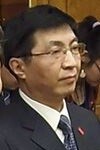hankyoreh
Links to other country sites 다른 나라 사이트 링크
[Column] Lack of foreign policy strategist undermining Moon’s diplomacy efforts

Shotaro Yachi, Japan’s National Security Advisor, is regarded as being the strategist for Japanese Prime Minister Shinzo Abe. After entering the Ministry of Foreign Affairs in 1969, Yachi worked at embassies in the US and the Philippines and served as the head of the Treaties Bureau, the head of the Foreign Policy Bureau and the Administrative Vice-Minister. Over the years, he has steadily supported the strategy of strengthening Japan’s military cooperation with South Korea and the US to counter the rise of China. His strategy has been using North Korea’s nuclear weapon and missile provocations as a pretext to strengthen the US-Japan alliance and enlist South Korea as a junior partner in that alliance while treating China and North Korea as an excuse to upgrade Japan’s military.
Wang Huning, Director of the Central Policy Research Office in the Chinese Communist Party, is President Xi Jinping’s foreign policy advisor and is referred to as “China’s Kissinger.” Wang is an expert in international relations who was the youngest person to become a professor at Fudan University in Shanghai. In 1995, at the age of 40, he was chosen to be an advisor for President Jiang Zemin, and he has continued to craft the ruling and diplomatic strategies for China’s next two leaders, Hu Jintao and Xi Jinping. For more than a decade, Wang has always been present when Chinese leaders have attended summits. He has been making one strategic move after another to solidify China’s “core interests” and to expand its influence in Asia while countering the US. But Wang is not the only brilliant strategist in Chinese diplomacy: there is also State Councilor Yang Jiechi and Foreign Minister Wang Yi, who is renowned for his dramatic diplomatic flourishes on the international stage.
No strategists are to be seen in South Korea’s foreign policy establishment. Concerns are being raised by various groups about the strategic vacuum in the Blue House’s foreign policy and security team, which is led by National Security Director Chung Eui-yong. When the Blue House finally announced its choices for ambassadors to the four key countries of the US, China, Japan and Russia after a long and difficult process, it only played up that the nominees are confidantes of President Moon Jae-in, without demonstrating any expertise or boldness.
Looking back at the government’s foreign policy during the four months or so that Moon has been in office, South Korea has been yanked around by US pressure and demands, watched its relations with China shift from hopeful to disappointing, and failed to properly respond to Japan, which has been trying to manipulate South Korea by staying in sync with the US. Russia is attempting to increase its influence in East Asia by strengthening its ties with North Korea.
Things got off to a bad start when Moon hurried to organize a summit with US President Donald Trump in June. Some thought that South Korea should make its own preparations for the situation on the Korean Peninsula before holding a summit, but they were overruled by those who said the US should come first. Another troubling incident occurred when special advisor on unification, foreign affairs, and security Moon Chung-in said during a visit to the US before the summit that the South Korea-US joint military exercises could be scaled back in consultation with Washington if North Korea halted its nuclear and missile activities. When the conservatives went on the offensive, the Blue House disturbingly rushed to distance itself from Moon, downplaying what he had said as being “just personal remarks.”
During the process of hastily arranging the summit, the US pushed for the THAAD deployment to be moved along, and South Korea gave in. Moon’s promises to carry out an environmental impact assessment and to review the process of deciding on the deployment vanished without a trace. South Korea was left to shoulder all the economic retribution resulting from the THAAD deployment. The abysmal state of South Korea-China relations are making strategic cooperation between the two countries impossible at the very time when such cooperation is necessary because of North Korea’s continuing nuclear weapons and missile provocation.

Even more discouraging is the fact that US President Donald Trump has zeroed in on the weakness that South Korea showed during the THAAD deployment and keeps sending South Korea expensive bills that it will have to pay. Since Trump’s political crisis in the US is forcing him to consolidate his supporters on the far right, he is threatening to withdraw from the South Korea-US Free Trade Agreement. Trump obviously hopes to pressure South Korea into going along with a revision of the agreement that is slanted heavily in the US’s favor. Trump seemed to be doing South Korea a favor by removing the limit on the weight of missile warheads, but the South will be paying the price by buying billions of dollars’ worth of US-made weapons and equipment.
The tectonic plates around the Korean Peninsula are shifting, largely because of North Korea’s reckless provocations and the growing threat of its nuclear weapons and missiles. There are no easy solutions. South Korea needs a new team of foreign policy and security strategists who have the expertise and the boldness to draw a new map and forge a new course while clearly maintaining a balanced strategy focused on South Korea’s perspective. Calling for tougher sanctions and more weapons every time North Korea commits a provocation won’t get us out of this crisis.
By Park Min-hee, international editor
Please direct questions or comments to [english@hani.co.kr]

Editorial・opinion
![[Guest essay] Preventing Korean Peninsula from becoming front line of new cold war [Guest essay] Preventing Korean Peninsula from becoming front line of new cold war](https://flexible.img.hani.co.kr/flexible/normal/500/300/imgdb/original/2024/0507/7217150679227807.jpg) [Guest essay] Preventing Korean Peninsula from becoming front line of new cold war
[Guest essay] Preventing Korean Peninsula from becoming front line of new cold war![[Column] The state is back — but is it in business? [Column] The state is back — but is it in business?](https://flexible.img.hani.co.kr/flexible/normal/500/300/imgdb/original/2024/0506/8217149564092725.jpg) [Column] The state is back — but is it in business?
[Column] The state is back — but is it in business?- [Column] Life on our Trisolaris
- [Editorial] Penalties for airing allegations against Korea’s first lady endanger free press
- [Editorial] Yoon must halt procurement of SM-3 interceptor missiles
- [Guest essay] Maybe Korea’s rapid population decline is an opportunity, not a crisis
- [Column] Can Yoon steer diplomacy with Russia, China back on track?
- [Column] Season 2 of special prosecutor probe may be coming to Korea soon
- [Column] Park Geun-hye déjà vu in Yoon Suk-yeol
- [Editorial] New weight of N. Korea’s nuclear threats makes dialogue all the more urgent
Most viewed articles
- 1Behind-the-times gender change regulations leave trans Koreans in the lurch
- 2Yoon’s revival of civil affairs senior secretary criticized as shield against judicial scrutiny
- 3Family that exposed military cover-up of loved one’s death reflect on Marine’s death
- 4South Korean ambassador attends Putin’s inauguration as US and others boycott
- 5Marines who survived flood that killed colleague urge president to OK special counsel probe
- 6A breath of fresh air: Innovative architecture in the time of COVID-19
- 7‘Weddingflation’ breaks the bank for Korean couples-to-be
- 8Dermatology, plastic surgery drove record medical tourism to Korea in 2023
- 9Hybe-Ador dispute shines light on pervasive issues behind K-pop’s tidy facade
- 10[Column] The state is back — but is it in business?